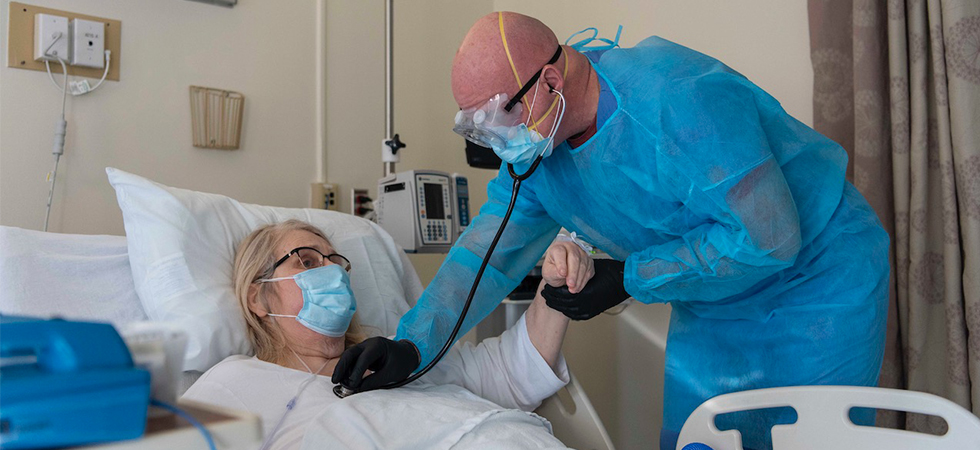Terrence Sheehan, M.D. ’86, P’23: A Leader in COVID-19 Response

Last spring, when the COVID-19 pandemic was surging across the United States, healthcare workers everywhere stepped up in meaningful ways to combat the spread. Terrence Sheehan, M.D. ’86, P’23 was one of those many health workers who took on extra hours and tasks to respond to the pandemic.
In April, when Maryland Governor Larry Hogan issued an executive order to build and operate advanced care sites to treat the influx of COVID-19 patients, Dr. Sheehan, who works as a chief medical officer (CMO) in the Adventist HealthCare system based in Rockville, MD, was enlisted to help lead the charge. He was appointed as the medical director at Adventist HealthCare’s Takoma Park alternative care site (ACS), one of the state’s three specialized COVID Hospitals built to treat Marylanders requiring inpatient hospitalization during the pandemic.
“These ACSs were designed specifically to treat COVID-19, but our work is about so much more; we are not just about helping them recover from the infection, but about restoring them physically,” said Dr. Sheehan. “These are state-of-the-art facilities that provide the latest therapies and rehabilitation techniques and have some of the hardest-working and most compassionate staff in the field.”
Dr. Sheehan is responsible for overseeing medical care at the Takoma Park ACS for those experiencing acute COVID-19 symptoms, which opened at the end of May 2020. The hospitals have seen a steady climb in patients since September, forcing the site to continuously expand its capacity growing from 20 beds to 150 beds from November to January and opening an ICU. As of January, the hospital has served approximately 1600 patients.
“It has been a stunning experience to be part of the team doing the logistics of operationally opening and staffing a brand new, yet temporary, hospital,” he said. “Healthcare workers from all over the country have arrived and needed to be oriented and trained efficiently in order to care for all these patients. It was an incredible task and we have a great team working on this.”
According to the healthcare network’s website, patients at the Adventist HealthCare ACS receive daily provider visits and are prescribed restorative therapy from an experienced on-site rehabilitation team of physical, speech, and occupational therapists to help them regain strength before returning home.
“I am on the unit every morning seeing patients who are going to need rehab afterwards,” he said. “Those needing to be treated are the most vulnerable in our community, including elders, those with multiple chronic medical issues and disabilities, and those with fewest resources. It’s heart-wrenching on one end and motivating on the other.”
Dr. Sheehan shared that he and his staff have used an iPad translator to communicate with many of its Spanish, Mandarin, and Korean patients. “Those who end up here have the least. The disparity in resources just compounds an already difficult situation,” he said.
During the first wave of COVID-19 last spring, Dr. Sheehan shared that each day was consumed by Zoom meetings, treating patients, and attending to the administrative side of the crisis, including working with incident command and tracking and responding daily to “the surge”; physically redesigning nursing units to isolate patients and protect healthcare workers; and serving as a member of the ethics committee developing solutions to shortages of personal protective equipment and ventilators.
“I have never been more thankful for my liberal arts education,” said Dr. Sheehan. “My liberal arts education was put to the test. My ability to think broadly was a significant contributor to the questions raised, particularly on the ethics committee. We had to address questions such as if we run out of ventilators, what do we do? Who is prioritized in a pandemic surge: healthcare workers lives or patient lives? I was engaged, participated, and felt I needed to be there.”
Today, with the second wave, he has shifted focus to daily patient care on the ACS. He works closely with the team to identify what level of restorative therapy is needed to return the patients home safely. “I still feel like I’m in the right place at the right time,” said Dr. Sheehan. “We’re just rolling up our sleeves and doing it.”
Despite his greatest efforts battling against COVID-19, Dr. Sheehan and his wife contracted the virus in November. “I didn’t get it from the hospital, it was community transmitted,” said Sheehan, who received his first dose of the Moderna vaccine in January. “We were in bed for two weeks; we were symptomatic together and recovered together. It is now a memorable part of our 40 years together.”
